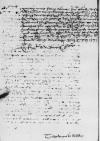⌊⌋ Reverendissimae Dominationis Vestrae nona huius scriptas hesterna die recepi, quibus certior fio Reverendissimae Dominationi Vestrae non adversari, quod putem regia securitate me non egere, attamen ob singularem, qua Reverendissima Dominatio Vestra me complectitur, benevolentiam existimabat illa opus esse. Hanc Reverendissimae Dominationis Vestrae opinionem ex vere paterno proficisci amore certissime persuasum habeo, quamquam visis et lectis nuper ⌊regiae maiestatis⌋ mandatis contra dominum ⌊Alexandrum⌋ editis non potui, quantum ingenii mei fert captus, quicquam ex illis deprehendere, quod me complecteretur aut respiceret. Et certe scio me numquam quicquam contra suam ⌊maiestatem⌋ egisse, nam dum in ⌊Urbe⌋ adhuc essem praesens, suae maiestatis oratores et nuntios iuxta condicionis meae exiguitatem obsequio et benevolentia semper prosecutus sum, nec Reverendissima Dominatio Vestra, quod temere et ea inconsulta velim ecclesiam ipsam accessis<s>e, credat. Ideo ultimis meis ⌊⌋ consilium et mentem Reverendissimae Dominationis Vestrae expetebam, iam vero ex ultime ad me datis ⌊⌋ facile colligo Reverendissimae Dominationi Vestrae omnino securum non videri, ut sine regio securitatis diplomate illuc me conferam, cum ex domino ⌊praeposito⌋, uti eadem Reverendissima Dominatio Vestra scribit, non sit quod metuam, attamen ab aliis non sit Reverendissimae
Dominationi
Vestrae diiudicare. Igitur gratiosissimo Reverendissimae Dominationis Vestrae consilio, uti semper facere statui, obtemperabo, et nihil nisi quod eidem consultum visum fuerit, agam.
Quantum autem ad consilium illius, qui nuper ex ⌊Livonia⌋ rediit, attinet, certe hic nihil consuluit, quam quod libenter meam apud ecclesiam videret praesentiam, et domum sive curiam suam, qua etiam dudum usus sum, donec aliunde mihi provideretur, hospitii iure obtulit. Attamen, Reverendissime Domine, cum omnia exacte considero, video ⌊dominos et confratres nostros⌋ mutua et non vulgari inter se, pro dolor, simultate et rancore certare, [quod] quidem re vera me male habet et a residentia ibidem mentem meam ferme alienet, cum mihi alicubi (laus Deo), ubi in summa tranquillitate et pace, cuius etiam sum studiosissimus, vivere possum, abunde satis provisum est. Igitur Reverendissima Dominatio Vestra, ne suo paterno desit consilio, ac mentis et voluntatis suae sententiam ut perscribat, rogo. Ego (uti decet) consilio acquiescam et lubens iussa capessam.
Interim etiam aliunde exspecto litteras, quibus receptis quid mihi faciendum agendumve erit, considerabo. Et me Reverendissimae Dominationi Vestrae, quam possum vehementissime, commendo.


